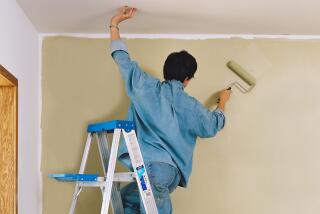Virtue, by the mop bucket
Itâs no accident that earthiness as a household aesthetic -- think macrame wall hangings, abundant houseplants and those pesky little droppings they leave -- took hold in the early 1970s, right around the time women cut the cord between their vacuum cleaners and their value to society. But one glance at TV these days makes it clear that dirt and debris, like body hair (that other relic of the â70s), are out of style in a very big way.
On the heels of the shelter-porn cable boom comes an army of missionaries poised to help the messiest cases. Now Lifetime has joined in with âHow Clean Is Your House?,â a reality program premiering tonight.
The show practices rehabilitation through outright humiliation. When I took a peek, I had to hide my eyes under the covers. Images of mold, grease, clumps of hair and animal waste appear in such unflinching close-up that I found myself longing for that digital scrambling technique used on exposed nipples and explicit T-shirts.
But I also found myself thinking that 30 years after cleanliness gave up its seat next to godliness, itâs realigned itself with the entire notion of morality. As we see on âHow Clean Is Your House?â as on the countless home improvement shows that promise better living through paint sponging, being a respectable member of society is now contingent not just upon earning a living or loving oneâs neighbor. It also means good hygiene, a flattering wardrobe and a pristine, stylish home. âBeforeâ and âafterâ pictures have become stand-ins for religious conversion. Always, they elicit tears. All over cable television, the rapture comes again and again -- even to a condo in Alhambra.
The name âHow Clean Is Your House?â suggests that we might learn how clean our own houses are. Instead, the program is the closest thing we currently have to a public stockade. The subjects of the first episode, a middle-class family from Tujunga that has somehow failed to do the dishes for weeks and allowed traces of human fecal matter to collect on the sofa, appears to have been cast solely to make us feel better about ourselves (another empowering moment from Lifetime). Comprising five children, 10 cats, two pet rats, a pet snake, and two addled parents who are given to remarks like âthereâs just too much to cleanâ and (on the subject of the grease-laden microwave) âthrow it away and buy a new one,â the Bradfords are in as much need of a licensed therapist as they are a steam cleaner.
âHow Clean Is Your House?â is chiefly about Kim Woodburn and Aggie MacKenzie, its droll and starchy British hosts, who are already stars in England and may just be headed for cult status here. But even their endearing, larger-than-life presence cannot eclipse the enormous elephant that lurks in every rancid room of the Bradford home. As the hosts survey the damage, the theme from âPsychoâ screeching in the background at the sight of unflushed toilets, pet droppings and a master bed containing a brick, a screwdriver, and box of old French fries, I wanted nothing more than some answers to the questions that tumble from this show as if from an overloaded dryer: Whatâs really going on when thereâs cat poop in your bed and pet rats running loose in your kidsâ bedroom? When does run-of-the-mill messiness become pathological and where is the 12-step program that will treat it? Unfortunately, and unaccountably, âHow Clean Is Your Houseâ doesnât address any of that.
BBC Americaâs program âThe Life Laundryâ does, exploring our relationship to our possessions with some interesting depth. Whether we hoard them or just abuse them, our things can become a stand-in for our very souls.
In every segment of âThe Life Laundry,â a heap of household clutter is placed in a yard or warehouse for the owner to behold in all its meaningless glory. Then, only a few items are allowed to be salvaged. âIâve been forced to face the fact that I probably canât do everything,â says one tearful hoarder who risked losing his wife if he didnât pare down the debris that blocked her movement through the house. âIt is,â he adds, âat great personal cost.â
The new clutter consciousness is about financial as well as personal cost. Thatâs because itâs ultimately a matter of social class. Cleanliness can be bought in the form of professional help. But does that mean morality can be bought? When I was growing up, I believed only rich people had housekeepers. Today, there is a vast force of cheap immigrant labor that cleans the houses of those who canât be bothered or, increasingly, just donât know how. When I think back on the messy houses I knew in the â70s, I remember their occupants as distracted college professors, hippie-ish artists, maybe even (horrors) feminists. The messy house was an anti-bourgeois statement. Today it suggests poverty, possibly even mental illness.
It also suggests something almost as bad: sexual undesirability. Watching these programs and, in all honesty, noticing my own domestic priorities (the older I get, the more I care about my sofa more than my shoes), I wonder if a new Victorianism has descended upon us, one that shuns not sex in and of itself but sex involving those who are not suitably clean, groomed, and in possession of the proper, âQueer Eyeâ-sanctioned Crate & Barrel bed. âYou should be denied all bedroom pleasures,â Woodburn says to the Bradford man-of-the-house. She scolds his wife about the bedroom, asserting that the couple cannot possibly have intimate relations there.
Granted, very few people would sing the erotic possibilities of a bed featuring urine-soaked sheets, a brick, a screwdriver and a box of French fries. But itâs curious that the more wrapped up our culture becomes in acquiring things, the more value we place on keeping them out of sight.
It also seems possible, given growing tides of political (if not yet hygienic) dissent, that weâll see a return to that 1970s earthiness. In the recent film âWe Donât Live Here Anymore,â which is ostensibly set in the present day but bears all the trappings of its â70s source material, Laura Dern plays a character whose many failures are embodied in her messy house. Sheâs a pariah but sheâs also the energy center of the movie. When she rages, she rages like a woman with a messy house and nothing more to lose. Her cleaner, neater friends turn to cardboard in her midst. Maybe their next stop is the recycling barrel.
*
âHow Clean Is Your House?â
Where: Lifetime
When: 11 to midnight tonight
Hosted by: Kim Woodburn and Aggie MacKenzie
*
Meghan Daum is a Los Angeles-based novelist and essayist.
More to Read
The complete guide to home viewing
Get Screen Gab for everything about the TV shows and streaming movies everyoneâs talking about.
You may occasionally receive promotional content from the Los Angeles Times.







